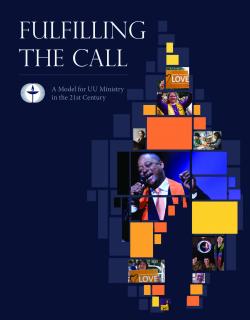Non-UU Ministers
Part of When Ministers Are Hard to Find

When your congregation is in search for a minister, but can’t find any viable candidates through the UUA’s Ministry Search System, your search committee may want to widen its search.
Only ministers who are “in fellowship” with the UUA are listed in the Ministry Search System. This means that the minister has a Masters of Divinity from an accredited seminary, completed an internship, completed at least one unit of Clinical Pastoral Education from an accredited program, completed a ministerial career assessment (which includes a psychological assessment), and been interviewed by the UUA’s Ministerial Fellowship Committee. These are the minimum standards of training and preparation for ministers serving UU congregations.
Because of our congregational polity, this decision is ultimately up to your congregation.
Vetting non-UU fellowshipped candidates will require more due diligence on the part of your search committee to verify credentials, check supplied references, develop and check additional references, and discern the candidate’s general fitness for ministry.
Hiring a non-UU fellowshipped minister also requires the congregational leadership to develop internal expectations and systems around ethical guidelines, accountability, and alignment with UU theology and identity.
Individuals (e.g. seminarians and people transferring from other religious traditions) who are preparing for the UU Ministry are bound by rules set by the Ministerial Fellowship Committee and are not allowed to serve congregations as a minister until they have been granted preliminary fellowship. Doing so may jeopardize their standing. (In unusual circumstances, they may be allowed limited permission to serve a congregation, but that needs to be a conversation between the person preparing for ministry, your congregation’s primary contact, and the Ministerial Credentialing Office.)
Check your bylaws. Some congregations require that their ministers must be members of the UUMA, or in fellowship with the UUA, which is recommended. Those who are not in fellowship with the UUA may apply for associate membership.
Ministers Who Go By “Rev.”
Just because a candidate calls themselves “The Rev. XXXX” does not mean that they have met similar criteria as fellowshipped UU ministers.
Mail-Order Or Internet Ordinations
Organizations like the Universal Life Church offer ordination with little or no vetting or training. This credential is often sought by individuals who wish to officiate at a friend’s wedding, but it does not prepare them for the complex demands of ministry in our congregations.
Ordination By A UU Congregation Without Being in Fellowship
In our polity, the honor of ordination is bestowed by the local congregation, whether or not the individual has any formal ministry training. Such “local” ordinations are usually recognized by the IRS to classify someone as clergy, but it is not a credential that should be transferred to other congregations.
Ordination In Another Faith Tradition
Preparation for the ministry can vary greatly between denominations. Preparation for the ministry in most mainstream denominations (e.g. UCC, Disciples of Christ, Lutheran, Methodist, Episcopal, Reformed Jewish) is similar to that for Unitarian Universalists in preparation for parish ministry. Individuals ordained in non-denominational or some other faiths may have great preaching skills, but may be lacking in pastoral and organizational qualifications.
Guidance For Vetting Applicants
Fullfilling the Call is a resource that provides a framework for assessing the tasks and duties of ministry today and in the future. The handbook identifies the skills, knowledge and behaviors that ensure effective ministry.
As the search committee reviews applications, they should pay attention to baseline competencies, experience beyond preaching, parish experience, and ethical accountability.
If they are not from a mainstream denomination, check to see if their resume includes:
- A Masters of Divinity from an ATS-Accredited School
- At least one unit of ACPE-Accredited Clinical Pastoral Education or equivalent experience in pastoral care in a congregation or other setting
- Experience in parish ministry
Ask for a detailed resume, with education and work experience both in secular and religious organizations. If they have a website with this information, make sure you compare the information side-by-side with other applicants.
Ask for references from places where they have served, and ask their permission to develop your own references from those conversations.
Ask if they have collegial relationships with any fellowshipped UU ministers, and ask if you can talk to them.
Talk to denominational leaders, especially “field staff” who work directly with congregations where the applicant has served.
Check with their credentialing body to see if they are in good standing with their own tradition. Why are they seeking settlement outside of their own tradition? Would they be eligible for settlement in their own tradition? Ask if there are any red flags, like sexual abuse, bullying, or embezzlement.
After an initial interview, if you are considering hiring the applicant, perform a background check, (and perhaps a credit check) before proceeding. (You don’t want to get too far in the process before this crucial step.)
Guidance for Interviewing Applicants
Asking about theology may seem like the most important question when interviewing a minister ordained in another faith tradition (e.g. are they “too Christian?” or “too Humanist?” for your congregation’s sensitivities), there are often more important differences regarding power and authority that can result in conflict with the lay leadership.
Ask about what they see as the role of the minister in decision making and leadership. What is their understanding of ministerial authority? Ask them for examples. How does this fit with your congregation’s style of decision making and leadership?
Do they understand how your organizational systems operate?
Do they have experience in supervising staff of diverse faith experiences?
How would they supervise UU staff?
What do they know about the parts of ministry that happen outside of worship?
Do they understand congregational polity and the historical roots of Unitarian Universalism?
Ask about their commitment to antiracism and dismantling systems of White Supremacy Culture.
Ask them questions about Unitarian Universalism—do they understand our movement? Can they name any famous UUs and what was UU about them? Can they pass along the knowledge of who we are, and where we’ve been to your congregation, especially those new to Unitarian Universalism?
Are they able to talk about liberal and liberation theology? Can they hold their own in interfaith settings? Will they be respected and understood as UU clergy by their local colleagues?
How will they get support and advice in the work of ministry?
Will they Join the UUMA as associate members, attend collegial gatherings, and abide by the UUMA Guidelines?
Guidance for Vetting and Interviewing Non-Clergy (In Addition To The Above)
Note: The master of divinity degree required by the UUA is a three year degree with an additional internship. The UUA also requires a career assessment , and additional training in clinical pastoral education . The wisdom and resilience needed in ministry take time and intentionality to develop.
Do they understand all aspects of ministerial leadership, from doing rituals and rites of passage, to leading worship, providing pastoral care, helping congregations in their developmental tasks, conflict management, administration, and teaching? Would they be legally able to perform weddings in your jurisdiction?
What is their skill base around pastoral/spiritual care? Have they had any training in pastoral/spiritual care, as opposed to social work, psychology, etc. (There are differences!) Do they have good boundaries about what is pastoral care vs. what is social work or counseling, which is not the role of a minister? Can they be trusted to hold confidentiality? Will they be able to respond in the way that your people want a minister to respond?
Will they be welcomed as a minister by other ministers (both UU and other faiths) in your area, or will they be isolated? How will you hold them to the same requirements/confidentiality/code of conduct as UU ministers?
How far did this person get in ministerial training (if they’ve had any), and why did they turn away? Are they thinking of continuing that education? Or are they going to make up for their lack of ministerial training? Would they be willing to undergo a ministerial career assessment and share the summary letter with your hiring team? Will the congregation support the decision to hire a non-minister?
Would the person expect the congregation to ordain them? (See above: Ordination by a UU Congregation Without Being in Fellowship)
Employment Contract
Your Congregational Life regional field staff can provide a template and guidance for the contract to protect the congregation’s interests should this prove to be an unsuitable match.
Other Considerations
Ministry is a very specialized, generalized, broad profession, and although there are probably people who can take on some tasks of ministry naturally and innately, the vast majority of people, if not everyone, can find those skills and gifts honed and increased by professional training. Congregations are fully free to ordain or call the person of their choosing, but it is wise to ensure that the person called is trained well enough so that they are a good choice for the congregation.
Please note that a non-UU minister will not be able to take advantage of some of the benefits or support available to UU ministers. They are not automatically delegates to GA; they are not eligible for several grants available from the UUA. They don’t necessarily receive informational mailings sent to UU ministers, and they may or may not be eligible for membership in the national or chapter-based UU Ministers Association.
You can set the expectation that your non-UU minister be an associate member of the UUMA and be accountable to the UUMA Guidelines.
As well, it may fall to the lay members of the congregation to carry the responsibility for ensuring the congregation is rooted in Unitarian Universalism. You may be the ones who have to educate potential members, and keep the connections with the wider movement. Many lay people are well suited to it, and others not.
Conflict or Misconduct
If there is misconduct involving a minister who is unaccountable to UUMA ethical guidelines or the Ministerial Fellowship Committee, the congregation will need to develop and depend on its own systems of accountability. (Your Congregational Life Staff can only serve as a thought partner.).
If there is a conflict, it may be difficult to navigate without a shared understanding of covenant and the minister’s place in UU systems and structure. The person you bring in might not have a commitment to (or even an understanding of) the mutuality and accountability of the relationship between minister and congregation.
